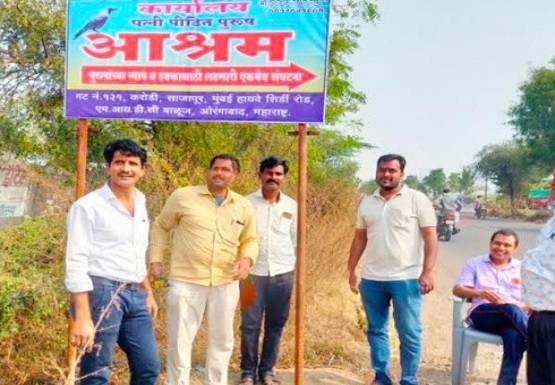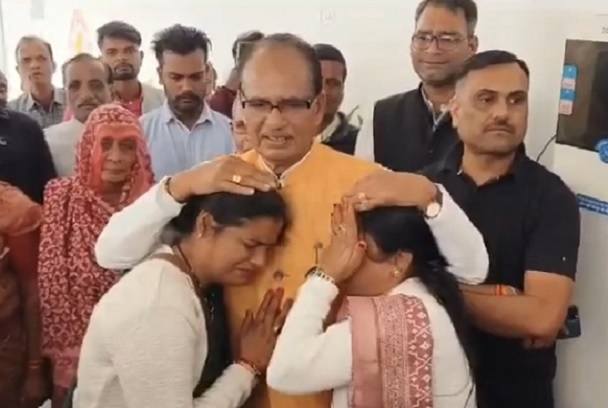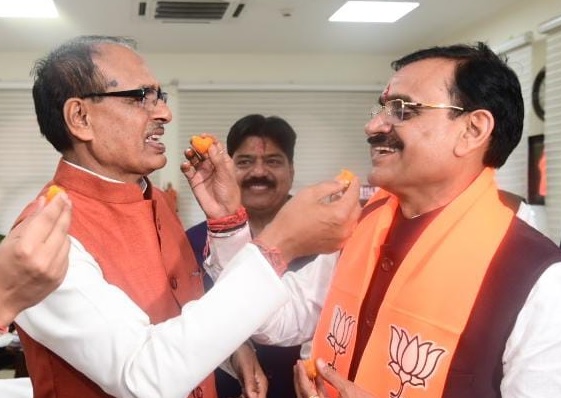Victims of Vendetta: Need to have a relook at Domestic Violence Act, stop its misuse

Shahid Parvez Sayed
NewsBits.in
MUMBAI/ AURANGABAD: Just imagine that you'd left home for work, telling wife and kids that you’d be back home by evening but suddenly you receive a call from a certain ‘official’ who informs you that your wife has filed a domestic violence against you and warns that you won't be able to return home that night or many more nights to come and may even lose access to your bank account.
Shocking it is to know that a judicial officer decides this ex-parte, solely on the basis of a complaint from the wife. No one investigated the claim, no one separated chaff from the truth. She filed the complaint, got the order and now it is being executed. The person gets stunned.
The woman's immediate needs will be provided, onus will be on you, but you won't be allowed to see your children until the court orders, which could take weeks. You have your work files, your clothes, your laptop and other stuff in the house. Now you wonder, how could they keep me away from my own house and from my kids!
But that’s the harsh reality and it happens when you face the Domestic Violence Act 2005 - a law that has become a powerful tool, especially, when the intent is to misuse and maliciously target a person. Despite being drafted in the 21st century, the act seems to lack a modern perspective.
It is truly concerning to see how this law has become an irresistible weapon and is often used to manipulate the system and harm innocent men. The need of the hour is to revisit and revamp this law, so that it serves its intended purpose of protecting victims of domestic violence, rather than being misused for personal gains.
There are constant reports of misuse of the law. Despite reservations from Soli Sorabjee, the former Attorney General of India, and Renuka Chaudhary, the Minister under whose ministry the bill was passed. Even countless judges have expressed their concerns about the legislation from time to time.
This legislation has caused untold harm to innumerable men who have been wrongly implicated in false cases for no fault of their own. The definition of domestic violence is so broad that it’s hard to escape an innocent act from it. Section 3 of the act itself covers whole nine yards of human interaction and more.
It encompasses everything from physical, economic, verbal, sexual, emotional abuse and everything associated with acts of omission and commission of any acts remotely connected with any violence, some of which might be considered trivial or harmless. Moreover the ‘victim’ is only the woman and everyone around her from husband to his relatives are accused. Some of the interesting acts that may come under the ambit of violence are as follows:
- Disregards for the sentiments of wife
- Temperamental attitudes towards the wife
- An angry look, sugar coated joke, a blank look
- Ignoring wife in important family matters
- Being secretive
- Showing his frustration on wife
- Demanding sex when wife is unwilling, refusing sex when she is willing
Life doesn't come with a manual, and we all learn as we grow up. When it comes to the Domestic Violence Act, there's a concern that young adults, especially those in their late teens or early twenties, might not understand the complexity of adult relationships and the nuances of domestic violence.
The Act's broad definition of violence, which includes everything that happens between husbands and wives, raises questions about its intentions. Is the law's goal to create an idealistic image of men, or does it takes into account the reality of human relationships and their complexities?
It's important to acknowledge the past injustices and inequalities faced by women, both in India and around the world. However, it's equally important to recognize that the solution to these problems is not to swing the pendulum too far in the opposite direction.
The Domestic Violence (DV) Act, like IPC 498 of the Indian Penal Code, has been subject to misuse to the point where several men's organizations have emerged to defend innocent men. One of these organizations is headed by Advocate Bharat Fulare, who operates the 'Patni Pidit Pati Ashram' [Ashram for husbands victimised by wives] in Aurangabad.
According to statistics provided by the organization, 90% of IPC 498 cases and 70% of DV cases against men are false and are being filed to 'teach husband a lesson,' causing them to suffer from sleepless nights, heartache and trauma. The organization has over 9763 registered men from all over India, with more than 40 NGOs are working to address the alleged biases and prejudices in this piece of legislation.
Advocate Fulare says ‘Men also have feelings. Men are also abused but no one appreciates their feelings, and no one is ready to raise their voice on the abuse done to them. Men have become helpless because there is no facility to tell if they are abused. There was a time when women were abla (weak) but law made them sabla (strong), now men are weak and we need a new law or commission to protect men.
Almost 10,000 persons have joined his platform so far. In his Ashram, which he set up, daily several people who are facing misuse of DV Act, arrive for consultation. Also, there is constant effort to raise awareness on this issue and the organisation has presence in many states.
In Sumana Bhasin v. Neeraj Bhasin & Shiv Kr. Bhasin , a metropolitan magistrate of Saket Court, Shivani Chouhan has dismissed the domestic violence complaint of a woman, saying that she falsified various allegations and suppressed important facts in order to harass her husband and in-law. Court observed that the woman misused the legal provisions as a tool to extort unjustified money from her husband and in -law for unjustified personal gain. The Court imposed a cost of Rs-1 lakh as exemplary cost.
In the case of Major Singh & Anr. v. Sarabjit Kaur, the wife filed a false complaint against her husband since she was having an extramarital affair. She tried to threaten her husband but her husband filed for divorce. The judgment passed by the Punjab High Court was that Protection of Women from Domestic Violence Act is being misused to terrorize the spouse, their families and distant relatives and this phenomenon has now acquired the name of ‘legal terrorism'.
In the case of Bawinder Verma v. Richa Sharma, the Punjab High Court held that it has been observed that the Protection of Women from Domestic Violence Act, 2005, suffers from inherent flaws, which tempt women to misuse their provisions and men to dread being prosecuted under law without any rhyme or reason.
WHAT NEEDS TO BE DONE NOW
A good law is that law which stands the test of times. In today’s fast changing world, we can’t let a law, passed in 2005 to address the issues of those times become a tool of harassment for an unscrupulous and immoral woman. It must be amended if not removed. We could resort to other means of safeguarding interests of wives. For example:
Let Lok Adalat be the first respondent in case of domestic violence. Let the Lok Adalat presiding officer to decide whether indeed violence has taken place before setting loose the state machinery against the men. This approach keeps both parties on their toes and with the help of trained ADR (alternative dispute resolution) experts; a mutually beneficial resolution could be reached.
Another option would be to increase the number of investigative officers who are capable of conducting fair and unbiased investigations into women's complaints. For instance, in a case from the US, a couple had separated and the wife had left. The husband moved to a new apartment complex and began rebuilding his life.
One day, the wife showed up at his new apartment uninvited, caused a commotion, and went to the police to falsely accuse her husband of beating and throwing her out. In this case, the husband survived the wife's "teach him a lesson" agenda because the investigative officer corroborated her story with the evidence and found her to be lying. They sent the woman to a shelter home with a warning not to go near her husband.
This law was needed in the past to address the abuse and torture that the 'bahu; was going thru in Zamindar'sHaveli in the middle of nowhere and had no access to the outside world. Today, with families going nuclear that Haveli does not exists anymore and everyone including his 2 year old grand kids are wired to the internet 24x7.
Hence. empowered to reach out to the authorities to address any abuse within the confines of the walls. With increasing urbanization and mobility and CCTV cameras monitoring all public places it is not possible for anyone to take law in to their hand and abuse a woman at his whims and fancies.
It must also be noted that in a marriage where Domestic Violence case was filed is more likely to result in divorce. In other words, this law is encouraging divorce and the last thing we want in our society is rampant divorce. Law making is a continuous process that should reflect the values and aspirations of the society.
However, this does not justify the retention of a structurally flawed legislation on the books for decades, especially when it has been misused. The cornerstone of the criminal justice system is the presumption of innocence until proven guilty, but unfortunately, this doctrine falls apart when it comes to spousal relationships.
It is time to recalibrate the DV Act 2005. We cannot afford to let down the other 50% of India's population. The law should look out for the rights of both husband and wife and encourage them to live happily ever after.Anything less would be a grave injustice to the institution of marriage.
[Senior advocate Shahid Parvez Sayed, who is a practicing High Court lawyer in India has multiple degrees including MSCE (USA), MBA (USA), LL.B(India), DJ&FS (India). He has been writing on legal issues consistently. The author's views are his personal. He can be contacted at shahidsayed@gmail.com]
References
1: Commentary on protection of women from domestic violence against Act 2005, N.K.Acharya
2: https://ylcube.com/c/blogs/misuse-protection-women-domestic-violence-act-2005/
3: https://www.thelawbug.com/how-far-is-the-domestic-violence-act-2005-justified/









